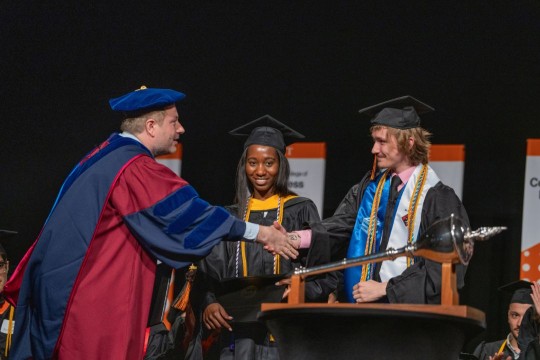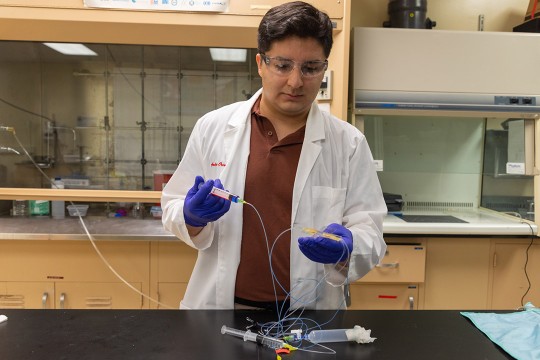Data Science Master of Science Degree

Data Science
Master of Science Degree
- RIT /
- Rochester Institute of Technology /
- Academics /
- Data Science MS
Overview for Data Science MS
Data science is one of the hottest fields in computing. The data science degree gives you the practical and theoretical skills to handle large-scale data management and analysis challenges that arise in today’s data-driven organizations. This program appeals to professionals looking to enhance their skill set, and includes opportunities for customized course work within the broad field of data science and its various application areas.
RIT’s Data Science Master’s: On-Campus or Online
In response to the growing need to generate and analyze meaningful data across all industries, demand is on the rise for a new breed of professionals skilled in both analytics and computing. RIT’s MS in data science encourages you to work with faculty experts in the fields of data science, analytics, and infrastructure who provide hands-on experience solving real problems. The curriculum includes opportunities for you to choose elective courses to pursue a variety of career paths within the broad field of data science and its various application areas. The program prepares you—regardless of your scientific, engineering, or business background—to pursue a career in data science.
RIT’s colleges of Science and Computing and Information Sciences collaborated to deliver the data science master's, which combines the expertise and knowledge from faculty in both colleges to provide you with a unique understanding of math, computing, and technology. This approach enhances your learning outcomes and increases career marketability.
What You'll Learn
- Concepts and skills in machine learning to prepare you to build, tune, and discover actionable insights from predictive models
- Programming language skills in Python and Java to be able to synthesize large unstructured data sets
- Competencies in data mining, regression analysis, text mining, and predictive analytics
- How to create, critically assess, interpret, and communicate rich visualizations
A Data Science Master’s Curriculum Packed with High-Demand Skills
The explosive growth in demand for data science skills is disrupting today’s job markets. These skills are found in over half of all job postings related to this field.
- Data Analytics: Data analysis skills are projected to grow in demand to 82% by 2026, and machine learning skills are growing by 1-2%.
- Data Science: Demand for skills in artificial intelligence is growing by 128% and deep learning skills demand is growing by 135%.
- Software and Programming: Demand for expertise in Python is growing by 21%; blockchain skills are growing by 245%.
- Experimental Design: Crossover, adaptive, and equivalence designs are dominating 38% of this job market.
Designed for working professionals studying on campus or online part-time, this degree program has a strong career focus. You’ll learn both practical and theoretical skills to handle large-scale data management and analysis challenges ever-present in today’s data-driven organizations. This program places a unique focus on training data scientists in strong software engineering skills so that they can effectively develop real-world data science applications which operate within modern organizations' computational workflows. You’ll be learning with students from varied professional backgrounds and working with practitioners active in the field to provide hands-on experience solving real problems.
-
Affordable Now. Valuable for Life.
Earn your master’s degree without the full price tag. With Master Up you can receive a 30% tuition scholarship for an RIT master’s degree.
-
Join us for Fall 2026
Many programs accept applications on a rolling, space-available basis.
Careers and Cooperative Education
Typical Job Titles
| Data Scientist | Data Engineer | Data Architect |
| Machine Learning Engineer | Data Analyst | Database Administrator |
| Statistician | Business Analyst |
Cooperative Education
What makes an RIT education exceptional? It’s the ability to complete relevant, hands-on career experience. At the graduate level, and paired with an advanced degree, cooperative education and internships give you the unparalleled credentials that truly set you apart. Learn more about graduate co-op and how it provides you with the career experience employers look for in their next top hires.
Cooperative education is optional but strongly encouraged for graduate students in the data science MS degree.
Featured Work and Profiles
-
Video: RIT Computing Graduate Students Thrive in Academia and Industry
Learn more about our leading research opportunities and state-of-the-art facilities in this new video.
Read More about Video: RIT Computing Graduate Students Thrive in Academia and Industry -
Student researchers pave the way for human-centered AI advances
Student summer researchers work to build a mobile app for interactive machine learning and visualization tool to verify data in support of human-centered models.
Read More about Student researchers pave the way for human-centered AI advances
Curriculum for 2025-2026 for Data Science MS
Current Students: See Curriculum Requirements
Note for online students
The frequency of required and elective course offerings in the online program will vary, semester by semester, and will not always match the information presented here. Online students are advised to seek guidance from the listed program contact when developing their individual program course schedule.
Students are also interested in
Admissions and Financial Aid
This program is available on-campus or online.
On Campus
| Offered | Admit Term(s) | Application Deadline | STEM Designated |
|---|---|---|---|
| Full-time | Fall or Spring | Rolling | Yes |
| Part-time | Fall or Spring | Rolling | No |
Online
| Offered | Admit Term(s) | Application Deadline | STEM Designated |
|---|---|---|---|
| Part-time | Fall or Spring | Rolling | No |
Full-time study is 9+ semester credit hours. Part-time study is 1‑8 semester credit hours. International students requiring a visa to study at the RIT Rochester campus must study full‑time.
Application Details
To be considered for admission to the Data Science MS program, candidates must fulfill the following requirements:
- Complete an online graduate application.
- Submit copies of official transcript(s) (in English) of all previously completed undergraduate and graduate course work, including any transfer credit earned.
- Hold a baccalaureate degree (or US equivalent) from an accredited university or college. A minimum cumulative GPA of 3.0 (or equivalent) is recommended.
- Satisfy prerequisite requirements and/or complete bridge courses prior to starting program coursework.
- Submit a current resume or curriculum vitae.
- Submit a personal statement of educational objectives.
- Submit two letters of recommendation.
- Entrance exam requirements: GRE optional for Fall 2026 applicants
- Submit English language test scores (TOEFL, IELTS, PTE Academic, etc.), if required. Details are below.
English Language Test Scores
International applicants whose native language is not English must submit one of the following official English language test scores. Some international applicants may be considered for an English test requirement waiver.
Duolingo (DET): 130
IELTS: 6.5
LanguageCert Academic: 74
PTE Academic: 60
TOEFL: 88/4.5
International students below the minimum requirement may be considered for conditional admission. Deaf and hard-of-hearing test takers with significant hearing loss do not need to take the listening and speaking sections for the TOEFL and IELTS. Each program requires balanced sub-scores when determining an applicant’s need for additional English language courses.
How to Apply Start or Manage Your Application
Cost and Financial Aid
An RIT graduate degree is an investment with lifelong returns. Graduate tuition varies by degree, the number of credits taken per semester, and delivery method. View the general cost of attendance or estimate the cost of your graduate degree.
A combination of sources can help fund your graduate degree. Learn how to fund your degree
Additional Information
Prerequisites
It is expected that prospective students will have a sufficient background in object-oriented programming. However, accepted students without this prerequisite knowledge may complete prescribed bridge course(s) that are available.
Bridge Courses
Students whose undergraduate preparation or employment experience does not satisfy the prerequisites can make up for this by completing prerequisite bridge course(s), as prescribed by the graduate program director. The bridge course(s) are not part of the 30-semester credit hours required for the master’s degree. Grades for bridge course(s) are not included in a student’s GPA if taken before matriculation; they are included if completed after matriculation. Since bridge programs can be designed in a variety of ways, the graduate program director will assist students in planning and course selection.
Using edX MicroMasters Credit (Online Only)
Applicants interested in leveraging their edx MicroMasters for credit toward the online Data Science MS program should send their edX MicroMasters program record to RIT using these instructions and we will add the credential to their application for review.
Online Degree Information
The online Data Science MS program can only be completed part-time, taking one or two courses per term. The average time to completion is two and a half to three years. For the fully online Data Science MS, core classes are offered asynchronously, as are many electives. Students can complete the degree without any synchronous courses. Program electives are slightly more limited than courses available in the on-campus program, and some may be synchronous only. Any live group discussions or class meetings are typically optional and may be recorded, and students should connect with their professor to obtain the material. Students typically spend 10-12 hours per week per class, depending on the content and their background knowledge. The online program culminates with a capstone course and capstone project. For specific details about the delivery format and learning experience, contact the Program Contact listed on this page. RIT does not offer student visas for online study.
Online Tuition Eligibility
The online Data Science MS is a designated online degree program that is billed at a 43% discount from our on-campus rate. View the current online tuition rate.
Online Study Restrictions for Some International Students
Certain countries are subject to comprehensive embargoes under US Export Controls, which prohibit virtually ALL exports, imports, and other transactions without a license or other US Government authorization. Learners from the Crimea region of the Ukraine, Cuba, Iran, North Korea, and Syria may not register for RIT online courses. Nor may individuals on the United States Treasury Department’s list of Specially Designated Nationals or the United States Commerce Department’s table of Deny Orders. By registering for RIT online courses, you represent and warrant that you are not located in, under the control of, or a national or resident of any such country or on any such list.
Accreditation
FAQs
Yes, co-op is optional but strongly encouraged for data science MS students. It provides the opportunity to complete relevant, paid career experience with industry partners prior to graduation.
Yes, the data science MS is available fully online on a part-time basis. The online curriculum offers core courses and select electives, allowing working professionals to complete the degree in approximately two and a half to three years.
The data science program accepts students from various backgrounds. However, if you lack specific prerequisites in programming or mathematics, you may be required to complete bridge courses to ensure you are ready for the core curriculum.
Yes, the on-campus data science MS is a STEM Optional Practical Training (OPT) program, which allows full-time, on-campus international students on an F-1 student visa to stay and work in the U.S. for up to three years after graduation.
Related News
-
January 15, 2025

College of Computing to split Commencement into two ceremonies
To accommodate its growing number of graduates, the Golisano College of Computing and Information Sciences will hold two separate commencement ceremonies beginning in 2025.
-
April 29, 2024

Students discover research opportunities on the path to graduation
Independent research projects can help cultivate critical thinking, collaboration, and problem-solving skills. Whether it’s late nights spent in a RIT lab or a field study in the mountains, research experiences can be a cutting-edge way for students to prepare for the future.
-
April 3, 2023

RIT Master Plan gives graduate tuition scholarship to eligible alumni
RIT is offering a graduate tuition scholarship to recent alumni seeking to expand their career potential through the university’s graduate programs. Alumni can enhance their skill set for the new economy through master’s degrees that build upon collaboration, analytical thinking, complex problem solving, and flexibility.
Contact
- Paola Pena Rodriguez
- Senior Assistant Director
- Graduate Admissions
- Enrollment Management
- 585‑475‑5529
- paeges@rit.edu
Travis Desell
Erik Golen

















